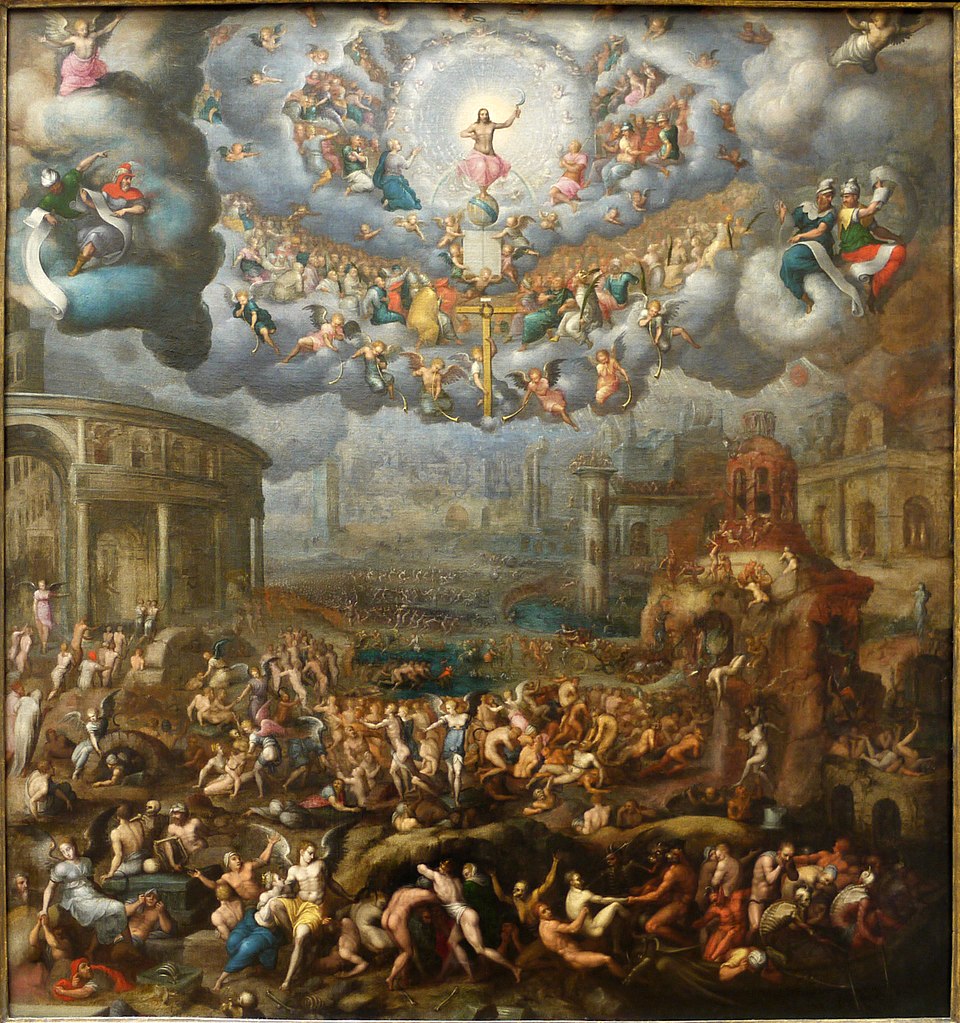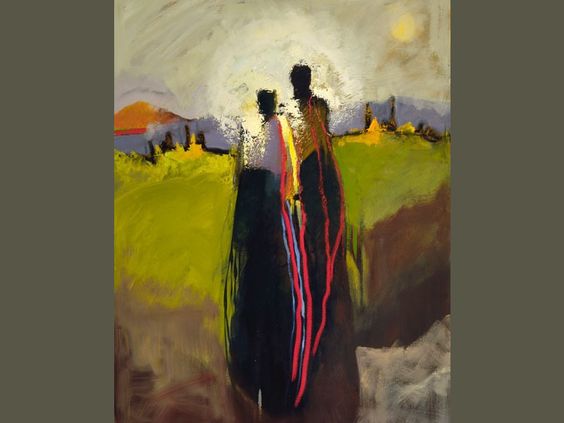The First Sunday of Advent, Year C: Jeremiah 33:14-16, 1 Thessalonians 3:12 – 4:2, Luke 21:25-28, 34-36.
It is right and just that Advent starts with looking forward to Christ’s coming, that is, “coming in a cloud with power and great glory,” as He himself attests in the gospel reading. Yes, in the liturgical calendar, this season occurs before the birth of the Christ child in Bethlehem, but the real waiting and anticipation that we are doing – right here, right now – as Christians alive in this last age is the waiting for the end of the world and the final judgment. We celebrate the birth of Christ at Christmas, but we don’t live in a make-believe reality where He has not yet been born.
Too often we boil down Christianity to easy sayings (e.g., “God is Love”) and simple moral living. This is a great disservice to the density of the Christian life within which we live. Advent can easily be seen as a time simply waiting for the Christ baby to appear in the manger scene. Not so! Let’s remember that Christ has already begun His reign and has invited us to be a part of the kingdom while alive here on the earth. We can never be as fully united with God as we will in death, but we are given a way to experience the kingdom through the Holy Spirit, not to mention amazing role models (saints), sacraments, and spiritual communion. Not to mention, in terms of the hard facts of salvation history, Christ has ushered in this final era, whether we listen/understand/believe it or not. We are literally on the Way (to the end of humanity and all time), and the start of Advent is a reminder of exactly what it means to be on the Way.

God is, as the saying goes, love; and lucky for us! Jeremiah reminds us of God’s loving covenant with us: “I will fulfill the promise I made … I will raise up for David a just shoot … Judah shall be safe and Jerusalem shall dwell secure.” The Jews never forgot that our relationship with God rests on this undeserved covenant He made with us, and neither should we. Without this covenant, the end of the world would be as bad as every Hollywood apocalypse movie or dystopian sci fi novel would have us believe. But with this covenant, we have hope; more than hope, we have God’s very promise.
2000 years ago, God sent the “just shoot” from David’s line: Jesus. But His plan is even greater than we could imagine, because Christ ushers in an age where we have the ability to reach new spiritual heights, through Him. Those who listen to Him and abide in Him are able to experience the Kingdom and bring others to the Kingdom – a spectacular raising up of our souls and purpose that we couldn’t imagine possible. Christ promises that it will be hard, that we will be persecuted, and He himself accepts the most ignoble death to show us that in seeming weakness is the great, loving power of God. Thus, today’s second reading gives us St. Paul exhorting the Thessalonians to stick to the Way: “May the Lord make you increase and abound in love for one another and for all.” Why is this so important? Again, Christ has made possible for us the great spiritual purpose of making our way to the Kingdom. Apart from the saints, the vast majority of us will not experience the kingdom while still alive, but we must devote ourselves to it nonetheless. Paul explains why: “to be blameless in holiness before our God and Father at the coming of our Lord Jesus with all his holy ones.” The Way itself helps us get to the Kingdom, whether partially experienced while still alive or simply through our efforts that show us faithful to Him when He comes on the cloud with the heavenly host.
This is a great way to reflect on why Catholics have spent so much time on preaching and living the moral life. We may have gone too far from mentioning God in our moral writings and conversations over the centuries because it really makes no sense if you’re not on the Way. If you’re not living the dense Christian life, aware of ourselves here in the final age, then moral decisions are as arbitrary as evil ones. I would go so far as to say that there is no real purpose to choosing good if you are not at the same time knowingly choosing God. Secularists would say that lawful society, psychological health, or longevity would be perfectly good examples of the purpose behind choosing good vs. evil. I would respond that all of these are justifications that deliberately remove God from our existence, creating a seemingly rational, human-made world. But that type of world Christians flatly reject. Our lives are a gift directly from God – how can we remove Him from the equation and think it’s rational? Lawful society, psychological health, and longevity are certainly benefits of moral action, but they should not be the purpose or the goal. The purpose we act morally is that we love God first, and God (who is love) has given to us commandments and precepts to help us achieve a greater, fuller way to be human. The purpose is our loving relationship with God as His subjects, and in the final age in which we live, that purpose has the goal revealed by Christ: walking the Way to the Kingdom that will be finally commenced at some point in the future.
Oh, the anticipation, the waiting! Yes, this is the Advent spirit. In the gospel reading, Christ tells us, “People will die of fright in anticipation of what is coming upon the world, for the powers of the heavens will be shaken.” We are in a state of tension, but it’s no holding pattern, with nothing to do and no way to hasten its fulfillment. He has given us His Spirit to help us stay on the path to the Kingdom. And so He can say, “when these signs begin to happen, stand erect and raise your heads because your redemption is at hand.” This is the great Christian message of hope: the end of the world is not annihilation but redemption and reunion with God. Don’t be frightened, be excited! But also, be prepared. Christ somberly exhorts His apostles in this reading to stick to the Way and not to falter: “Be vigilant at all times and pray that you have the strength to escape the tribulations that are imminent and to stand before the Son of Man.” So … excited with an asterisk, that we must be obedient to Him.
Obedience is such a downer for today’s modern person, right? The modern would say that obedience equals stifling freedom of speech, obedience equals the white, rich status quo, and obedience prevents positive change. Where to start? It must always start with God, who is not a stifling influence but a creator, not a preventer but an expander of potential. When we take ourselves and our precious points of view so seriously that we forget that all we have is a gift we didn’t earn, then we are truly lost. In the end, obedience takes a heart docile to God, and once that happens, joy, wonder, and hope follow. Isn’t that what we want to experience in Advent?

Perhaps the most helpful short line in today’s readings comes from St. Paul: “conduct yourselves to please God.” This wraps up everything we’ve been discussing: acknowledging God’s supreme sovereignty, the true purpose behind moral actions, the way to live in this final age that has already been given Christ but yet awaits Him still. It is right and just that the operative word here is to “please” God. God wants to please us, His beloved creation; and as we grow in love for Him, we realize that wanting to please Him is our greatest calling.